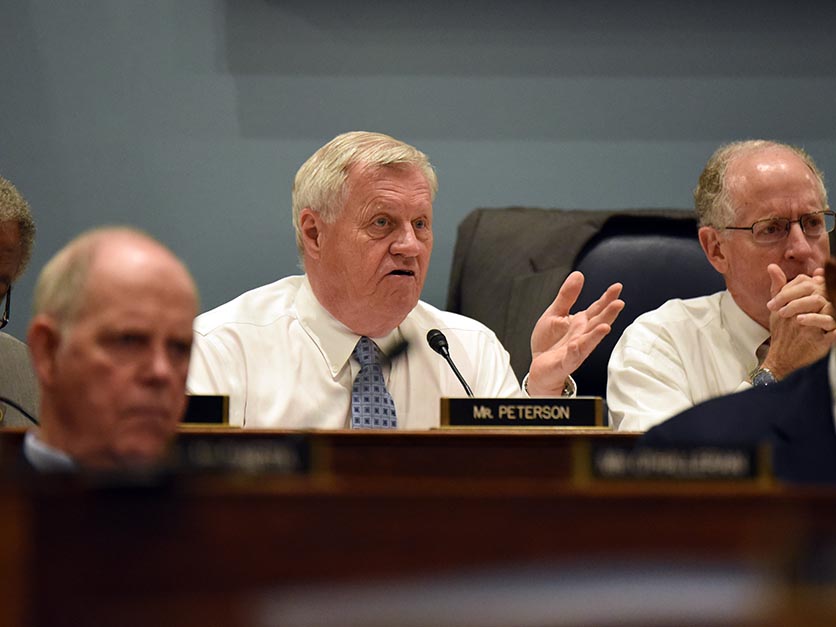Rep. Collin Peterson expressed confidence Wednesday that a new farm bill would be enacted before the Minnesota Democrat regains the chairmanship of the House Agriculture Committee in January.
Peterson acknowledged that the four lead farm bill negotiators had several issues yet to resolve, including House GOP demands for tougher food stamp work rules. But Peterson suggested House Agriculture Chairman Mike Conaway, R-Texas, has little incentive to block a deal in the upcoming lame-duck session after Democrats won control of the House on Tuesday, assuring that the committee gavel will pass to Peterson in 2019.
If the bill isn’t enacted by the end of the year, Congress will be forced to pass an extension of the 2014 farm bill, handling the writing of a new farm bill to a Democratic House that would be more likely to adopt amendments tightening payment limits or eligibility rules for commodity programs and crop insurance.
“I think we’re relatively close. I think we can work this out and get this done before this Congress adjourns,” Peterson said Wednesday of the negotiations.
He told reporters that Agriculture Secretary Sonny Perdue called him late Tuesday night and said he was looking forward to completing the bill. Peterson also said he had the full support of the Democratic leadership for finalizing a bill in the lame duck session.
In a White House press conference today, President Trump blamed Democrats for blocking progress on the farm bill, citing their opposition to the tighter food stamp work rules. The Democrats "just don't want to vote for that," he said.
The Trump administration is expected to release a proposed rule soon that could make it harder for states to get waivers from the existing work rules for participants in the Supplementary Nutrition Assistance Program, formerly food stamps. Peterson said he didn’t know whether that would give House Republicans sufficient cover to vote for a farm bill that doesn’t tighten the requirements. "Given what happened in this election I don't know what leverage they think they have" to win tougher provisions in the bill, he said.
Interested in more news about the farm bill, trade issues, pesticide regulations and more hot topics?
Sign up here for a four-week Agri-Pulse free trial. No risk and no obligation to pay.
As chairman, Peterson said he planned to move the Agriculture Committee into an oversight mode. One of the issues likely to get attention, he said, is Perdue’s plan to move USDA’s Economic Research Service and National Institute of Food and Agriculture out of the nation’s capital.
Peterson said his other priority as chairman would be to groom younger Democratic members of the committee to take over leadership when he steps aside. Peterson refused to say whether he would seek re-election in 2020. He said that the Democrats who will be added to the committee next are unlikely to have much background in agriculture.
“I get the indications from people that (Conaway’s stance) is going to change, but I might be wrong,” Peterson said.
The four farm bill negotiators, which include Senate Agriculture Chairman Pat Roberts, R-Kan., and the Senate committee’s ranking Democrat, Debbie Stabenow of Michigan, all will be back in 2019. While Peterson held off a stiff challenge in his district on Tuesday, Conaway and Stabenow won re-election easily. Roberts is not up for re-election until 2020.
Peterson defeated Republican Dave Hughes by 52 percent to 48 percent in a rematch from 2016.
The negotiators are not expected to meet in person until lawmakers return to Washington next Tuesday.
Peterson said the negotiators have legislative text and cost estimates in hand for options to settle various disputes but still need to work out deals.
The negotiations have been taking place among Senate and House Agriculture committee staff members for the last several weeks. Peterson said the talks were moving closer to resolving a dispute between Conaway and Roberts over provisions in the House bill that would end payments on unplanted base acres to offset the cost of allowing farmers in some drought-stricken areas to modify the yield data used for calculating Price Loss Coverage payments.
A source familiar with the negotiations said the possible compromise could include some types of incentives for farmers who lose the payments on base acres they haven’t been planting to program crops.
Peterson said the negotiators also haven’t agreed yet on changes to the Conservation Reserve Program and Conservation Stewardship Program. The House bill would increase the cap on CRP enrollment from 24 million to 29 million acres, a personal priority for Peterson, but would eliminate the Conservation Stewardship Program, which has significant support in the Senate.
“There are still people that have heartburn with some of this stuff that’s being proposed” on conservation programs, Peterson said without elaboration.
For more news, go to: www.Agri-Pulse.com


